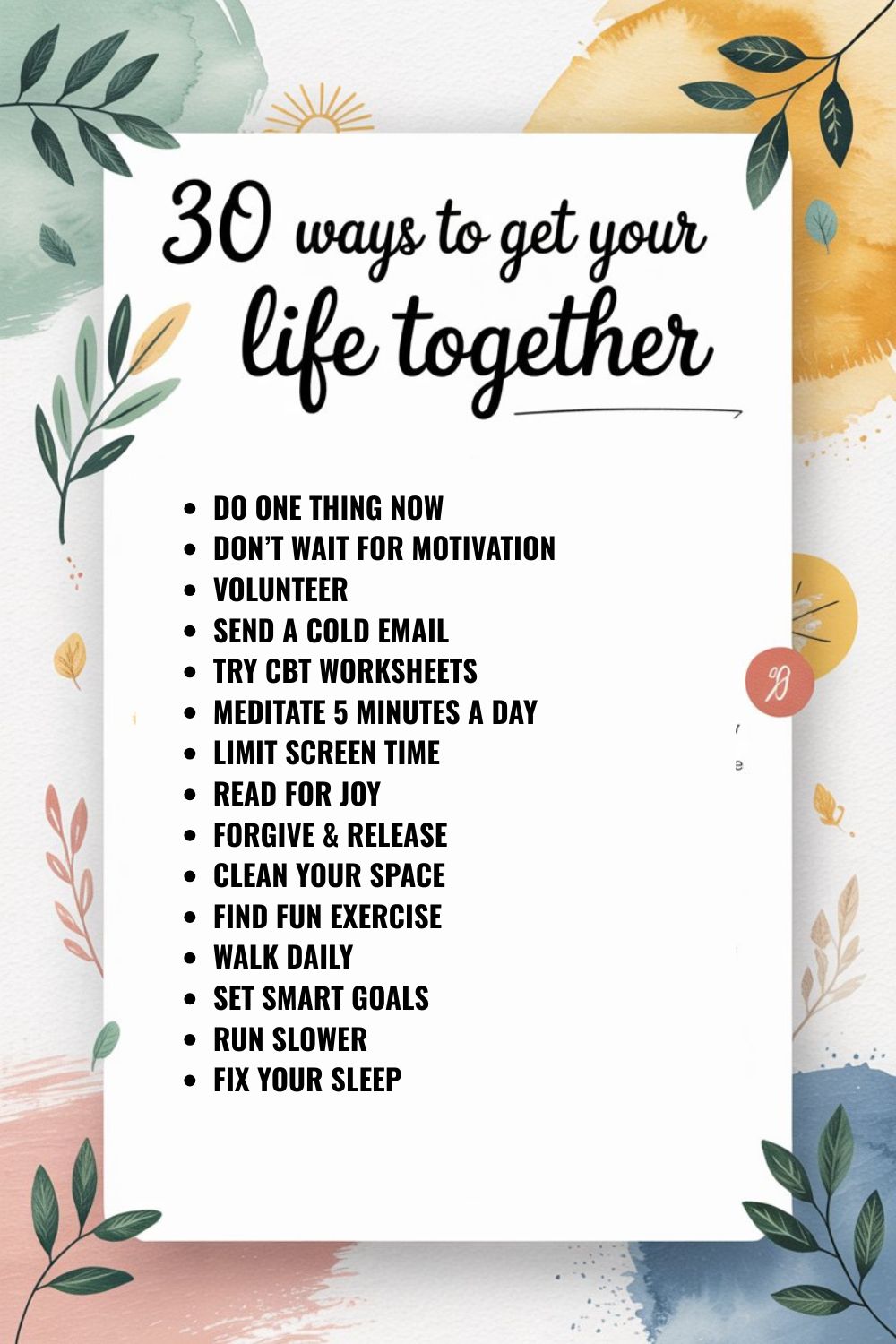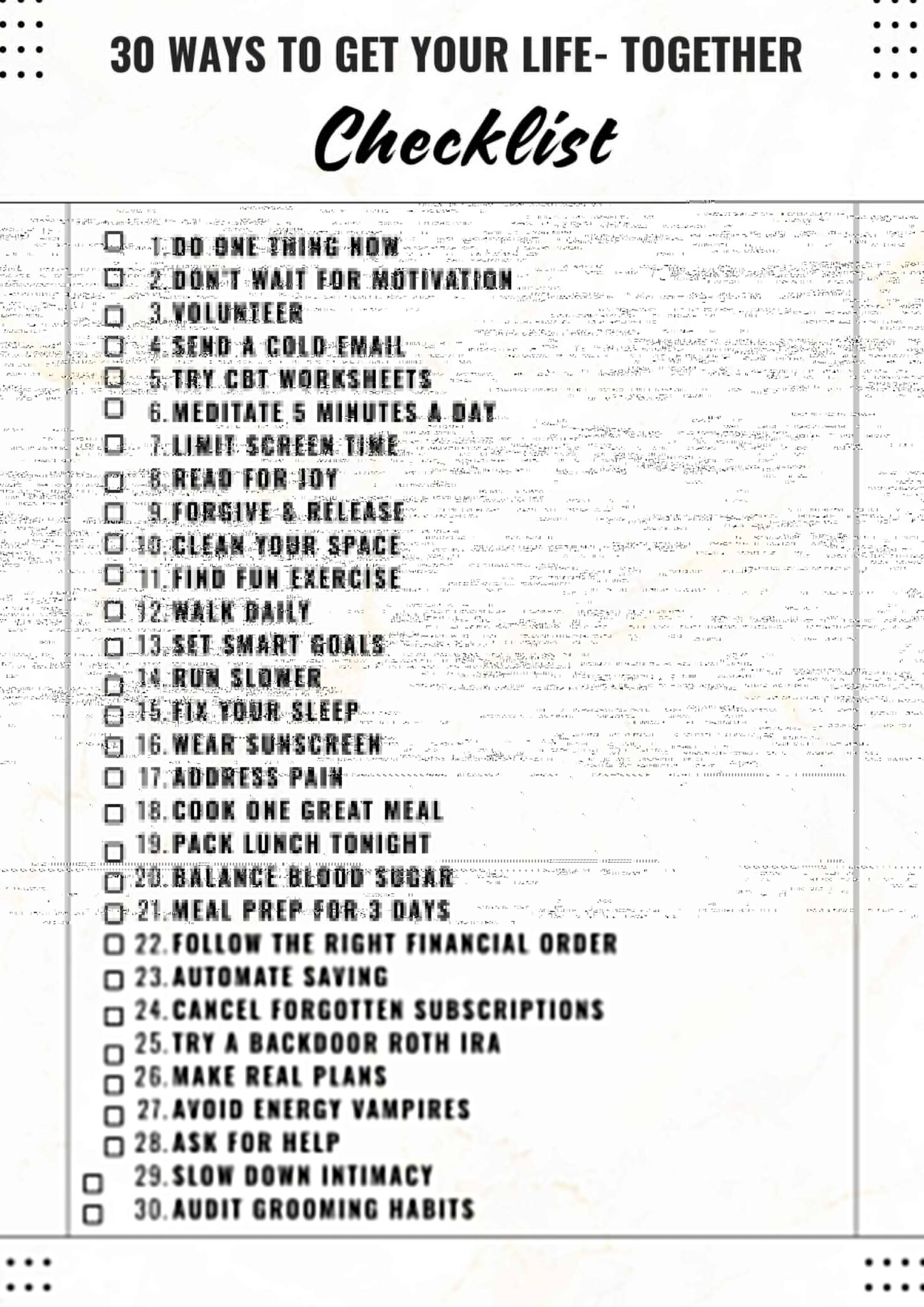Disclaimer: This post may contain affiliate links, meaning we get a small commission if you make a purchase through our link at no extra cost to you. For more information, please visit our Disclaimer Page.
Between the to-do lists, missed goals, and constant stress, it can feel like life is falling apart one unchecked task at a time.
If that sounds familiar, this get your life together checklist PDF was made for people like us — tired of spinning our wheels and ready to actually get back on track.
You don’t need a five-year plan to feel like you’re in control again — sometimes you just need a clear place to start.
In this post, we’ll walk through what to focus on first, how to stop the overwhelm, and what daily habits actually help you stay focused long-term.
No fluff, no fake advice — just simple moves that make life feel a whole lot less like chaos and a lot more like calm.
Let’s talk about taking life one solid step at a time.

Life can feel messy sometimes, and that’s completely normal. What matters is taking small, intentional steps toward the person you want to become.
Table of Contents
What Does It Mean to Get Your Life Together?
Getting your life together is a personal journey that involves creating stability and purpose in your daily routine. It means taking responsibility for your actions and making positive changes across different areas of your life.
You’re essentially building a foundation that supports your goals and values. This process looks different for everyone because we all have unique circumstances and dreams.
Life feels overwhelming sometimes. You wake up with a endless to-do list, your back hurts, you haven’t slept well in weeks, and everything seems out of control. You’re not alone in feeling this way – stress affects millions of people daily, and the pressure to have it all figured out can be crushing.
Getting your life together doesn’t happen overnight, but it’s absolutely possible with the right approach. This comprehensive guide offers 30 practical strategies that will help you regain control, reduce stress, and create the life you want.
Understanding Where You Are Right Now
Before you can improve your situation, you need to understand it completely. Take an honest look at your current state without judgment. This self-assessment forms the foundation of meaningful change.
Write down everything that’s bothering you – work stress, relationship issues, financial concerns, health problems. Don’t filter yourself during this exercise. The goal is to get everything out of your head and onto paper so you can see the full picture.
Here are the 30 ways to Get Your Life Together
1. Do Something – Anything
The biggest mistake people make is waiting for the perfect moment or the perfect plan. Action beats inaction every single time. Research shows that taking control of your circumstances, even through small actions, improves your mental health significantly.
Pick one thing that’s been bothering you and do something about it today. Send that email you’ve been avoiding, make that phone call, or clean that messy corner of your room.
2. Stop Waiting for Motivation
Motivation is unreliable and often comes after you start, not before. You don’t need to feel ready to begin – you just need to begin. Set a five-minute timer and work on something important until it goes off.
Most of the time, you’ll keep going past the timer. If you don’t, that’s okay too – you’ve still made progress.
3. Volunteer Your Time
Helping others provides perspective on your own problems while contributing to something meaningful. Getting knocked down quotes often remind us that service to others helps us rise above our own challenges.
Find a cause you care about and commit just two hours per month. The mental health benefits of volunteering are well-documented and immediate.
Building Mental and Emotional Strength
4. Try Cognitive Behavioral Therapy Worksheets
CBT worksheets help you identify and change negative thought patterns. You don’t need a therapist to get started – books like “Feeling Good” by David Burns provide excellent self-help resources.
Download free CBT worksheets online and commit to completing one per week. The key is actually doing the exercises, not just reading about them.
5. Meditate for Five Minutes Daily
Your mind needs exercise just like your body does. Start with just five minutes each morning using apps like Headspace or Calm.
Consistency matters more than duration. Five minutes every day beats thirty minutes once a week.
6. Get Your Screen Time Under Control
Most people spend far more time on their phones than they realize. Check your screen time settings and set daily limits for social media apps.
Try putting your phone in another room while you sleep. Charge it in the kitchen instead of on your nightstand.
7. Read Something You Actually Enjoy
Reading improves focus, reduces stress, and expands your knowledge. Pick three books that interest you and give yourself permission to switch if one isn’t engaging.
Keep one physical book and one audiobook going at the same time. Daily biblical affirmations can provide spiritual reading options for those seeking faith-based content.
8. Practice Letting Go of Grudges
Holding onto anger hurts you more than the person who wronged you. This doesn’t mean excusing bad behavior – it means freeing yourself from the emotional burden.
Write a letter to someone who hurt you (don’t send it). Express all your feelings, then burn or shred the letter as a symbolic release.
Physical Health and Wellness
9. Clean Up Your Living Space
Your environment affects your mental state more than you realize. Spend one hour organizing your most-used space – your bedroom, kitchen, or home office.
A clean, organized space reduces stress and increases productivity. Start small and work your way through your entire home gradually.
10. Find Exercise You Actually Enjoy
Willpower alone won’t sustain a fitness routine. You need to find movement that feels good to you. Try hiking, dancing, swimming, rock climbing, or pickup basketball games.
The best exercise is the one you’ll actually do consistently. Stop forcing yourself through workouts you hate.
11. Walk Every Single Day
Walking is one of the most underrated activities for both physical and mental health. Aim for 30 minutes daily, but even 10 minutes helps.
Use walking as meditation time, podcast listening time, or social time with friends. Make it serve multiple purposes in your life.
12. Set a SMART Fitness Goal
Vague goals like “get in shape” don’t work. Set specific, measurable, achievable, relevant, and time-bound goals instead.
Examples: “Run a 5K in under 30 minutes by December” or “Do 20 push-ups without stopping by March.” Sign up for a race or competition to add accountability.
13. Run Slower Than You Think
Most people run too fast when they’re building endurance. Sixty percent of your runs should feel conversational – you should be able to talk while running.
This builds your aerobic base without burning you out or causing injuries. Your heart rate should stay around 150 beats per minute or lower.
14. Fix Your Sleep Problems
If you snore or wake up tired despite sleeping 7-8 hours, see a doctor about sleep apnea. If you have trouble falling asleep or staying asleep, try cognitive behavioral therapy for insomnia.
Sleep affects everything else in your life. Prioritize it like you would any other health issue.
15. Wear Sunscreen Daily
Apply SPF 30 or higher to your face every morning, even on cloudy days. This single habit prevents premature aging and reduces skin cancer risk dramatically.
Make it part of your morning routine, right after brushing your teeth. Your future self will thank you.
Nutrition and Eating Habits
16. Cook One Delicious Meal
Ultra-processed foods dominate most people’s diets, contributing to numerous health problems. Cooking from scratch gives you control over ingredients and often tastes better too.
Start with one meal you can make well. Master it, then add another to your repertoire. Build your cooking skills gradually.
17. Pack Your Lunch Tomorrow
You don’t need to meal prep for the entire week. Just pack tomorrow’s lunch tonight. This saves money, improves nutrition, and reduces decision fatigue.
Keep it simple: protein, vegetables, and a healthy carbohydrate. A sandwich, salad, or leftover dinner works perfectly.
18. Balance Your Blood Sugar
Blood sugar spikes and crashes affect your energy, mood, and concentration throughout the day. Focus on whole foods, healthy fats, quality protein, and vegetables at each meal.
Avoid eating refined carbohydrates alone. Always pair them with protein or fat to slow absorption and prevent energy crashes.
19. Meal Prep for Three Days
Weekly meal prep often leads to food waste and boredom. Instead, prep for three days at a time. This keeps food fresh and allows for variety.
Spend 30 minutes twice per week preparing proteins, chopping vegetables, and portioning snacks. This small investment saves hours during busy weekdays.
Financial Health and Planning
20. Follow the Personal Finance Flowchart
Before making any financial decisions, understand the optimal order of priorities. Pay off high-interest debt before investing, but don’t skip your employer’s 401k match.
21. Automate Your Savings
The easiest way to save money is to never see it in your checking account. Set up automatic transfers to savings accounts immediately after you get paid.
Start with just $50 per month if that’s all you can manage. The habit matters more than the amount when you’re beginning.
22. Cancel One Subscription
Review your bank and credit card statements for recurring charges. Cancel anything you’re not actively using – streaming services, app subscriptions, gym memberships you’ve forgotten about.
Set a monthly reminder to review subscriptions. Companies count on you forgetting about these charges.
23. Fund a Backdoor Roth IRA
If your income is too high for traditional Roth IRA contributions, you can still benefit from tax-free growth through the backdoor Roth strategy.
Consult with a financial advisor or tax professional to ensure you’re executing this correctly. The rules are specific and mistakes can be costly.
Relationships and Social Health
24. Send a Cold Email
Reach out to someone whose work you admire. Don’t ask for anything – just express genuine appreciation for their contribution to your field or community.
Keep it brief, specific, and personal. Many people respond positively to thoughtful, non-transactional messages.
25. Plan a Social Gathering
Take initiative in your friendships. Suggest specific plans rather than vague “we should hang out” messages. Buy tickets to an event or make dinner reservations.
Qualities of a true friend include taking initiative and making concrete plans. Be that friend for others.
26. Identify and Distance Yourself from Toxic People
Some relationships drain your energy without providing mutual support or joy. Look for patterns of constant negativity, manipulation, or one-sided communication.
You don’t need to make dramatic announcements. Simply spend less time with people who consistently make you feel worse about yourself or your life.
27. Ask for Help When You Need It
Independence is valuable, but isolation is harmful. Most people want to help when asked directly and specifically.
Practice asking for small favors to build comfort with this skill. “Can you recommend a good plumber?” or “Would you mind reviewing this email before I send it?”
28. Have Slower, More Intentional Intimate Relationships
Rush culture affects every area of life, including physical intimacy. Slowing down allows for better connection and more satisfying experiences for everyone involved.
Focus on the journey rather than the destination. Communication and presence improve every aspect of intimate relationships.
Personal Care and Health Maintenance
29. Audit Your Grooming Routine
Use a dedicated face cleanser instead of body wash or hand soap. Replace deodorant that causes irritation. Address persistent skin issues with a dermatologist visit.
Good grooming isn’t vanity – it’s self-respect and health maintenance. Take care of problems before they become bigger issues.
30. Get an Annual Physical
Preventive healthcare catches problems early when they’re easier and less expensive to treat. Schedule your annual physical and actually keep the appointment.
Regular blood work can identify issues like high cholesterol, diabetes, or thyroid problems before you experience symptoms.
How to Get Your Life Together Checklist PDF

Creating Your Personal Action Plan
Now that you have 30 strategies, don’t try to implement them all at once. That’s a recipe for overwhelm and failure.
Choose three areas that feel most urgent or appealing to you right now. Maybe you need to address your sleep, start exercising, and clean up your finances.
For students juggling classes, work, and social life, prioritize sleep, exercise, and time management systems. Your academic performance depends on these fundamentals.
Men often benefit from focusing on physical health, career goals, and emotional intelligence first. Daily affirmations for men can support confidence during this process.
Women might prioritize boundary-setting, stress management, and personal goal-setting. The societal pressure to please everyone else first makes self-care particularly important.
People in their twenties should focus on building systems and habits that compound over time. Financial discipline, health habits, and relationship skills developed now pay dividends for decades.
Building Long-term Success
Getting your life together isn’t a destination – it’s an ongoing process. Be the best version of yourself by consistently working on growth and improvement.
Create systems that support your goals rather than relying on motivation alone. Motivation gets you started, but systems keep you going.
Track your progress in a journal or app. Seeing improvement over time motivates you to continue even when progress feels slow.
Maintaining Your Progress
Life will throw curveballs that disrupt your progress. Plan for setbacks and have strategies for getting back on track quickly.
Practice self love during difficult periods instead of being self-critical about temporary setbacks.
Remember that getting your life together is an act of self-respect and love. You deserve to live a life that feels good to you.
Build in regular reviews of your goals and systems. What’s working? What needs adjustment? How have your priorities changed?
The person you become through this process of intentional living is more valuable than any specific outcome. You’re developing resilience, self-awareness, and the ability to create positive change.
Start today with one small action. Your future self is counting on the decisions you make right now.
How to Get Your Life Together Quotes
Sometimes you need a few powerful words to reignite your motivation. Here are quotes to inspire your transformation:
- “Getting your life together doesn’t mean perfection — it means progress in the right direction, one honest decision at a time.”
- “Sometimes the first step to getting your life together is walking away from the version of you that settled.”
- “Clarity begins when you stop explaining yourself to people who never truly listened.”
- “You don’t find balance — you create it by choosing what to let go of.”
- “Your life changes when your priorities do. Focus is the real glow-up.”
- “Healing isn’t a final destination — it’s the quiet, messy work of showing up for yourself daily.”
- “You get your life together the moment you stop negotiating your worth with chaos.”
- “If it costs you your peace, it’s too expensive for the life you’re rebuilding.”
- “Your new life will cost you your old one — and that’s a price worth paying.”
- “Getting it together starts with getting honest about what’s breaking you apart.”
- “The version of you that’s disciplined, peaceful, and focused is not a dream — it’s a decision away.”
- “Growth looks like choosing discomfort now to protect your future peace.”
- “Every routine you build is a brick in the foundation of the life you deserve.”
- “You can’t organize a life you’re still pretending to enjoy — be real, then rebuild.”
- “Start by doing the next right thing, even if it’s small. Momentum begins with movement.”
Your Next Steps
Start with one small change today rather than trying to overhaul your entire life immediately. Pick something from this guide that resonates with you and commit to it for one week.
Download a habit-tracking app like Habitica or use a simple paper checklist to monitor your progress.
Tracking helps you stay accountable and see your improvement over time.
Remember that getting your life together is an ongoing process, not a destination. You’re not trying to reach a perfect end state—you’re building systems that support the life you want to live.
On a Final Note
Getting your life together doesn’t happen overnight, and it doesn’t require perfection. You’re not broken if you feel scattered right now—you’re just ready for positive change.
Start small, be consistent, and give yourself credit for taking action. Every step forward, no matter how small, is progress worth celebrating.
The fact that you’re reading this guide shows you’re already taking responsibility for your life and growth. Trust yourself to take the next step, and then the one after that.
Your future self will thank you for starting today, even if you can only manage one small change. You have everything you need to create the life you want—you just need to begin.






